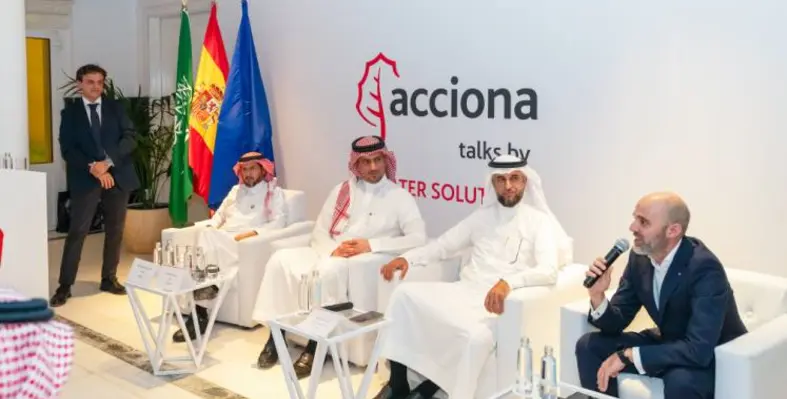ACCIONA, a global leader in delivering regenerative solutions for a decarbonised economy, hosted its inaugural panel discussion in a series of Talks aimed at promoting regenerative and sustainable solutions in Saudi Arabia
The event, held at the Spanish Embassy in Riyadh on Sunday, 28 April, brought together prominent figures from the water sector, government, and business to emphasise the importance of reverse osmosis technology in the water cycle.
Preceding the Riyadh event was the first panel discussion of its series titled "The Saudi solution for water sustainability: reverse osmosis desalination," which explored the effective formula for achieving water sustainability in the Kingdom through reverse osmosis technology.
Panelists included Khaled Al Qourashi (CEO of SWPC), Khalid Al Habib (chief investment officer at WTTCO), Mohammed Alhajjaj (CEO of ENGIE KSA), and Manuel Manjon, CEO of ACCIONA’s Water business line. Julio de la Rosa, Middle East business development director for ACCIONA's Water Business, moderated the discussion. The panelists shared insights from the water sector and stressed the importance of efficiently managing water resources to meet the needs of the growing population and expanding economy while ensuring access to clean water for future generations.
Due to Saudi Arabia's arid climate and limited freshwater resources, desalination plants are crucial for meeting water demand. The speakers highlighted how Saudi Vision 2030 prioritises investments in desalination technology like reverse osmosis and expanding existing plants to secure a reliable freshwater supply for domestic, industrial, and agricultural use.
Javier Nieto, KSA director for the water business of ACCIONA who participated as the keynote speaker, said, “ACCIONA’s expertise is directly relevant to the Kingdom’s Vision 2030 programs and goals. We see ourselves as partners that can enable the Kingdom to realise its vision of creating a vibrant, diversified and more sustainable economy and society. For example, the seven desalinations and wastewater treatment plants that we are building –and the two desalination plants that we have recently completed– will improve the water security of 8.3 million people and make the country more resilient to climate shocks.”
Reverse Osmosis in KSA
Saudi Arabia is a major producer of desalinated water, with numerous plants along its coastline. Reverse osmosis technology plays a critical role in addressing water scarcity by providing a sustainable water source for various sectors, contributing to economic development, environmental sustainability, and social well-being.
According to the latest ACCIONA Sustainability Report, desalinated water production in the Middle East is expected to increase significantly by 2040. In a region facing water scarcity due to climate change and population growth, Saudi Arabia ranks among the top per capita consumers of water globally.
ACCIONA's use of reverse osmosis technology emits fewer greenhouse gases compared to thermal desalination methods, making it a more environmentally friendly choice.








